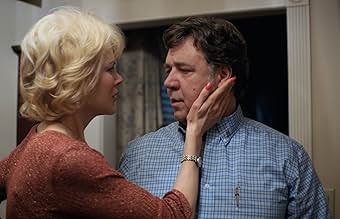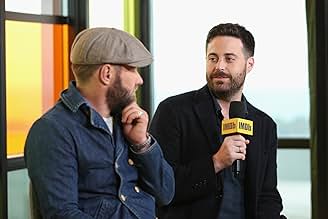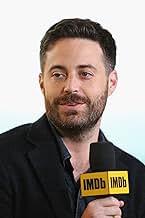O filho de um pregador batista é forçado a participar de um programa eclesiástico de conversão homossexual quando seus pais o forçam a sair do armário.O filho de um pregador batista é forçado a participar de um programa eclesiástico de conversão homossexual quando seus pais o forçam a sair do armário.O filho de um pregador batista é forçado a participar de um programa eclesiástico de conversão homossexual quando seus pais o forçam a sair do armário.
- Direção
- Roteiristas
- Artistas
- Prêmios
- 12 vitórias e 52 indicações no total
- Direção
- Roteiristas
- Elenco e equipe completos
- Produção, bilheteria e muito mais no IMDbPro
Avaliações em destaque
The other aspect of the book that is mostly missing from the movie is Garrard Conley's interior dialogue. The plot of the book is actually pretty thin; Garrard's self reflections and his insightful portrayals of the other participants make his book far more moving than the film.
And finally, the film ends with Jared's confrontation with his father. The movie makes it seem like the cowed teen is finally standing up to his tormentor, the author of his tragedy. In the book, I never perceived that Garrard ever views his father with anything other than love and respect, as a person of sincere and deeply held views. His book is dedicated to his parents. You wouldn't know that from the final scene in the film.
Author Conley declined to convert his memoir to the film because he felt ill-equipped to do so, and Joel Edgerton, for the most part, did an okay job. I'm curious if the movie did justice to the book because while it was good, it wasn't as hard-hitting as one is inclined to expect from an LGBTQIA+-themed movie. Maybe it doesn't have to be, maybe we're just wired to expect controversy then engage in long-hours' worth of debate, trying to raise consciousness and empathy for this sector of society that continues to ask for it. This movie just quietly slips by, just enough to make you ask questions on where you are on the kindness spectrum. Whatever the effect is, the hope is that we all become like that doctor that helped our main character in her own little way. She explained she held religion, on one hand, and science on the other. Religion (the organization, not to be confused with God) does not have the answer to everything, nor does Science. You can't deny one over the other. You can't say a sweeping statement about how God works in mysterious ways, letting someone die of illness when there is a cure that can be given by Science.
There's a scene in the movie where it says one is being selfish by continuing to sin just because you're gay. We were raised by a society that did not know how to look at the LGBTQIA+. We followed what was the first one to talk about it which was the Bible. The question is, how come we keep clinging to one or two sentences in the Old Testament that looks down upon them when there are hundreds of statements in the New Testament about loving unconditionally. So, imagine someone confused, looking for understanding and acceptance from the outside world because he hasn't found it in himself yet, and the world's response is to disown, to harass and to become violent towards them. Did we really expect those negative responses to change a person for the BETTER? Did we forget that violence, begets violence? So instead of making the world a better place, the Bible by way of how people interpreted it, contributed to the damaged society that we now live in. The only hope is that we're becoming better as each new generation comes in. Whether we're in the right direction is still up for debate. For years we have tried discrimination that has led to suicide, depression, abuse and many more. Let's see where love and understanding will take us.
I have seen movies on this theme before, the most recent being The Miseducation of Cameron Post. However, this hews closely to an autobiography, and at the Toronto International Film Festival, the actual mother and son showed up at the Q+A.
Lucas Hedges and director Joel Edgerton are wonderful as the main protagonists - the son and the therapy leader. Nicole Kidman only plays a supporting role as the mother, still a role bigger than Russell Crowe as the loving but misguided father. This is very much an advocacy film against gay conversion, and has the star power to get to a general audience.
As the synopsis states, This film tells the courageous story of Jared Eamons (Lucas Hedges), the son of a Baptist pastor Marshall Eamons (Russell Crowe) in a small American town, who must overcome the fallout of being outed to his parents - his mother Nancy Eamons (Nicole Kidman) is supportive of her husband's response. His parents struggle with reconciling their love for their son with their beliefs. Fearing a loss of family, friends, and community, Jared is pressured into attending a conversion therapy program. While there, Jared comes into conflict with its leader Victor Sykes (Joel Edgerton) and begins his journey to finding his own voice and accepting his true self.
The sessions in the therapy program dominate the film, with flashbacks of Jared in college and his rare gay acting out episodes with Henry (Joe Alwyn) and Xavier (Theodore Pellerin), misconstrued by invasive research by Sykes and his entourage. The fellow gay people are very well portrayed by Troye Sivan, Britton Sear, Emily Hinkler among others and one of the more realistic - about LGBTQ issues - characters, a Dr. Muldoon, is beautifully portrayed by Cherry Jones.
Lucas Hedges, Nicole Kidman, Russell Crowe and Joel Edgerton are all outstanding. The jolts of the film are many - including the facts about the characters as they are living now - and it is not an easy film to experience the truths about conversion therapy. But this is not only a fine film but also an important one for the public to learn about a process that still exists in some states.
Representation: LGBTQIA+ Characters On-Screen
Representation: LGBTQIA+ Characters On-Screen
Você sabia?
- CuriosidadesGarrard Conley turned down the opportunity to write the adaptation himself as he believed a filmmaker would be better fit to translate his memoir to the big screen.
- Erros de gravaçãoThe flag in the therapy room is hung backwards, with the canton to the right.
- Citações
Brandon: [with boys lined up on a masculinity scale] Fake it till you make it. Become the man you are not. So, you think Cameron here is the big winner, huh? You think being big and tall and overeating immediately puts a guy at the front of the line, but it's more that triangles and postures and genetics. A firm handshake. Let's go! Do it.
- Cenas durante ou pós-créditosThe title isn't shown until 11 minutes into the movie.
- ConexõesFeatured in WatchMojo: Top 10 Early Oscar Contenders You NEED to See (2018)
- Trilhas sonorasThe Good Side
Written by Troye Sivan, Allie X (as Alexandra Hughes), Bram Inscore, Jack Latham, Leland and Ariel Rechtshaid
Performed by Troye Sivan
Courtesy of Capitol Records/Universal Music Australia
Under license from Universal Music Enterprises
Principais escolhas
- How long is Boy Erased?Fornecido pela Alexa
Detalhes
- Data de lançamento
- Países de origem
- Centrais de atendimento oficiais
- Idioma
- Também conhecido como
- Corazón borrado
- Locações de filme
- Atlanta, Geórgia, EUA(on location)
- Empresas de produção
- Consulte mais créditos da empresa na IMDbPro
Bilheteria
- Orçamento
- US$ 11.000.000 (estimativa)
- Faturamento bruto nos EUA e Canadá
- US$ 6.788.692
- Fim de semana de estreia nos EUA e Canadá
- US$ 207.057
- 4 de nov. de 2018
- Faturamento bruto mundial
- US$ 11.853.081
- Tempo de duração1 hora 55 minutos
- Cor
- Proporção
- 1.85 : 1
Contribua para esta página












































